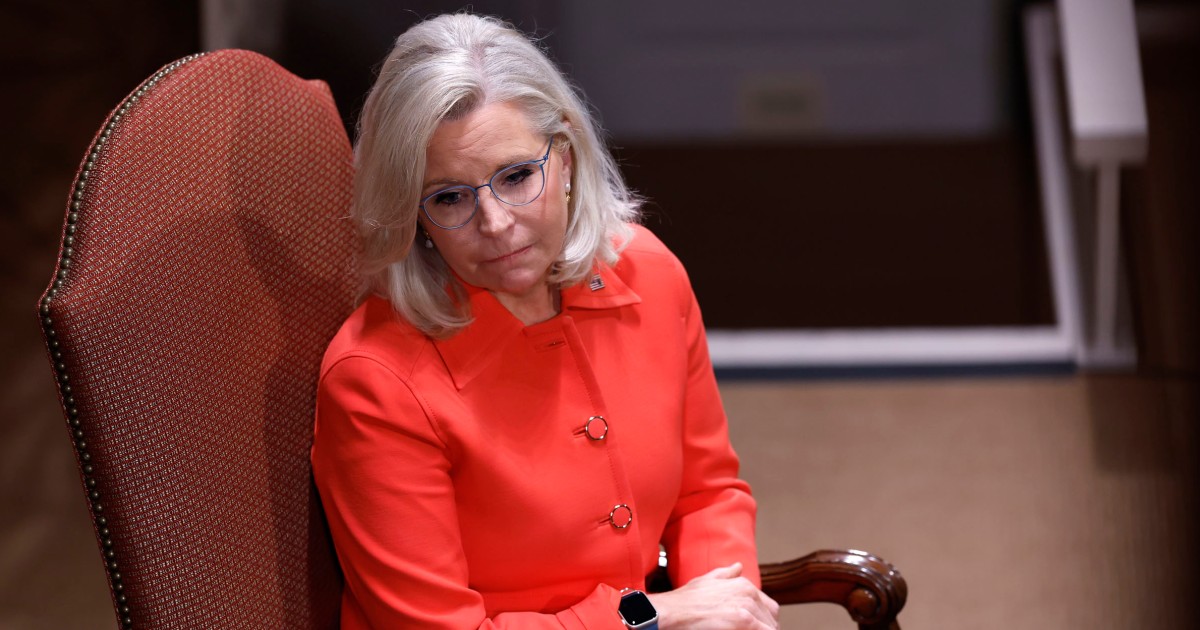
[ad_1]

Reports of GOP unity turn out to be greatly exaggerated.
If you were to read only reports of Donald Trump’s growing control of the party, you might think otherwise. Trump’s hand-picked candidates are routing candidates backed by the old guard; his takeover of the Republican National Committee is complete; and he has already clinched the party’s nomination. Polls show that a clear majority of Republican voters have not only rallied to his support, but also say they would back him even if he is a convicted felon.
Almost 1 out of 5 Republican primary voters — including nearly half of Nikki Haley’s supporters — say they will not vote for Trump in November.
And yet, the cracks in this narrative are unmistakable. Trump’s outsize control in the party is formidable — but it’s far from complete. That means figures who could pry those fissures open — such as former congresswoman Liz Cheney and former Vice President Mike Pence — could have an outsize influence on the 2024 election.
An NBC exit poll in Ohio this week found that almost 1 out of 5 Republican primary voters — including nearly half of Nikki Haley’s supporters — say they will not vote for Trump in November.
While 18% is not a majority, it’s not chopped liver either. And it’s consistent with what happened at ballot boxes across the country.
Even though Trump is running unopposed, large numbers of Republicans continue to refuse to vote for the ex-president. In Kansas, nearly a quarter (24.5%) of Republican voters came out to cast ballots for somebody else. In Florida, opponents who had dropped out of the race received 18.8% of the vote; in Ohio, it was 20.8%; in Illinois, 19.2%. And, in the crucial swing state of Arizona, 22.1% of Republicans voted for a non-Trump alternative, a result that led Haley’s zombie campaign to put out a congratulatory tweet:
Caveats are, of course, in order. As The Washington Post’s Aaron Blake has noted, primary election turnouts do not reflect what will happen in a general election. Some of the ballots may have been early votes that were cast before Trump’s opponents dropped out. Some of the “Republican” voters may have been Democrats or Trump-despising independents who crossed over to vote in “open primaries,” although Florida was a closed, Republican-only primary.
Nevertheless, it’s clear that disaffected Republicans are still very much in play, and there’s no indication that Trump is making any effort to heal the breach. If anything, by continuing to insult, mock and threaten anyone who dares defy him, he’s likely to drive the wedge even deeper.
Which is why Cheney and Pence matter so much right now.
At a forum in Connecticut last week, Cheney laid out the 2024 stakes in stark terms: If Trump returns to the White House, she said, “We’ll be living in a nation that’s unrecognizable, and the danger is so grave that, for the first time in my life, I will be working with every fiber of my body against the Republican nominee for president.”
She has not yet formally endorsed President Joe Biden but, as Washington Post columnist David Ignatius wrote, there’s little doubt where she is going: “Defeating Trump means re-electing President Biden and rejecting third-party candidates, she said forthrightly,” Ignatius wrote. ‘Though she disagrees with Biden on many policy issues, she said his victory in November is necessary to save the country from potential dictatorship.”
Will she be able to make a difference? Maybe.
Unlike others in the resistance, Cheney remains an unreconstructed conservative, so her message is targeted directly at swing-vote Republicans and independents. “She’s an anti-abortion, pro-gun, anti-tax conservative,” Ignatius noted. “But she thinks those policy differences are less important in November than defending the Constitution — which means stopping Trump.”
And then there is Pence. Unlike Cheney, Pence is not going to be endorsing Biden. But he is making a powerful case to wavering Republicans: Never Again Trump.
Perhaps because Pence played the role of truckling sycophant so effectively as Trump’s vice president, it may be hard for some observers to wrap their heads around his extraordinary — and surprising — defection. At the very moment when one “normie” Republican after another is falling into line behind Trump — Senate GOP Leader Mitch McConnell, New Hampshire Gov. Chris Sununu, Georgia’s Brian Kemp — Pence stands athwart his party and says, “Stop.”
Understandably, some progressives have been skeptical and even dismissive of Pence’s near (political) death-bed conversion. Which is fine, because he’s not talking to them.
He’s talking to conservative Republicans. And his message is: You don’t have to go along with this. The election is not simply binary choice. Despite what everyone else is saying, you can disagree with the Democrats on policy, but you do not have to vote for Trump.
He’s telling those voters: Trump was wrong about Jan. 6, and he’s not a real conservative.
And he’s telling evangelical Christians: I vouched for him in 2016 and again in 2020. My bad. You have my permission to repent.
As it happens, there are still thousands of Trump-Pence signs scattered across the landscape of Red America, making for ironic reading today.
But Cheney and Pence are hardly alone. Just run through the extraordinary list of former Trump Cabinet members, chiefs of staff, defense secretaries and national security advisers who are refusing to endorse him.
Their warnings about the dangers of a second Trump presidency aren’t coming from Democrats or the hosts on MSNBC — they are coming from inside the house.
And in a close election, that could make all the difference.
[ad_2]
Source link
